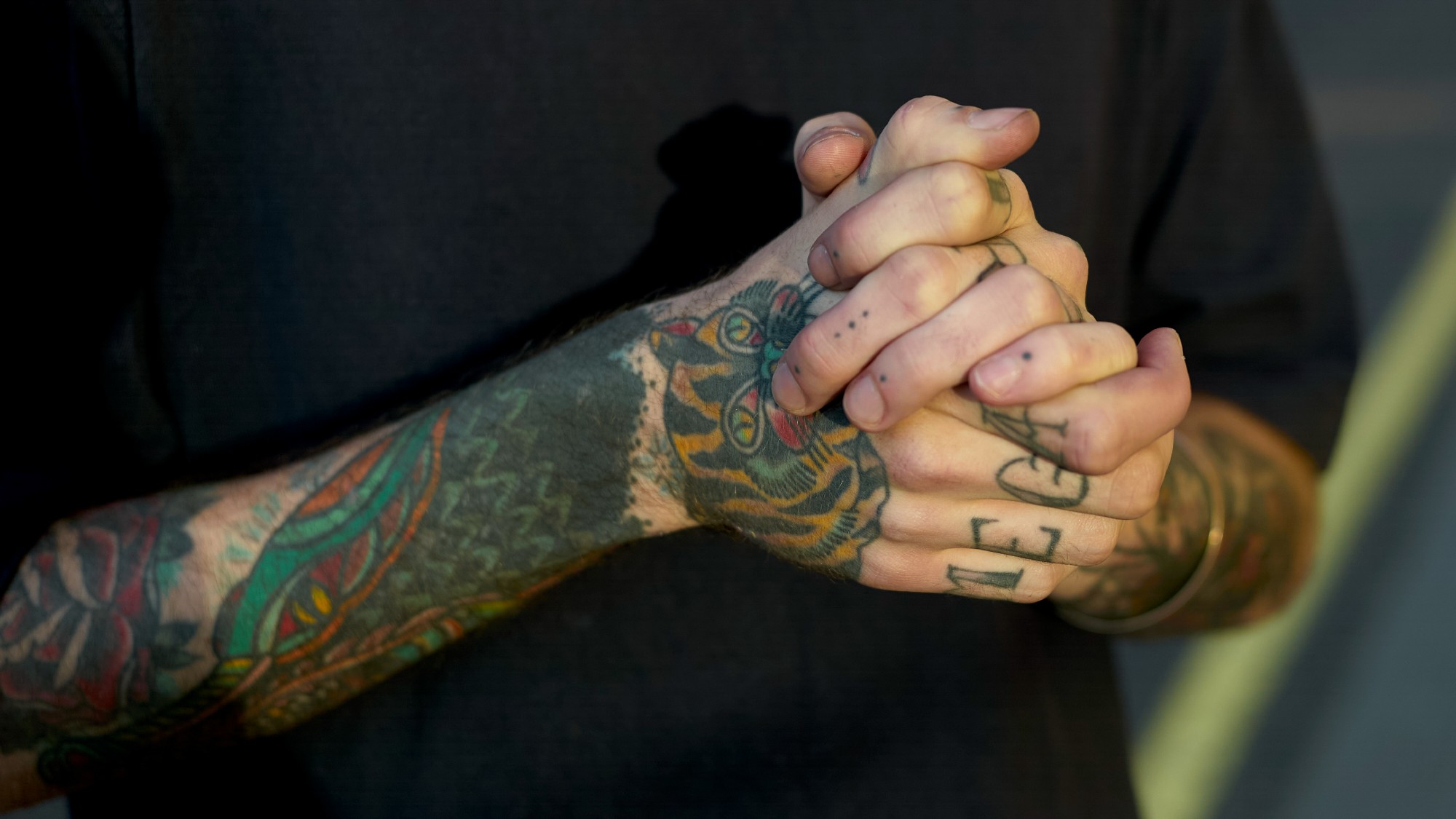Venezuelan deportees: Locked up for tattoos?
A former pro soccer player was deported after U.S. authorities claimed his tattoo proved he belonged to a Venezuelan gang

A free daily email with the biggest news stories of the day – and the best features from TheWeek.com
You are now subscribed
Your newsletter sign-up was successful
As details emerge about the 238 Venezuelans deported to a brutal El Salvador prison, it’s become clear why the Trump administration gave these accused gang members no “semblance of due process,” said Shirin Ali and Mark Joseph Stern in Slate: Evidence of their criminality “is weak to the point of nonexistence.” The administration called the men members of the gang Tren de Aragua and thus subject to immediate deportation under the 18th-century Alien Enemies Act. But stories are emerging like that of Jerce Reyes Barrios, a former pro soccer player who was “living peacefully” in the U.S. with no criminal record. Barrios, 36, says he sought asylum in the U.S. after being arrested, electrocuted, and suffocated in a protest against the Venezuelan regime. Now U.S. authorities claim that his tattoo of a crown atop a soccer ball inspired by the logo of his favorite team, Real Madrid, proves he belonged to Tren de Aragua. Many others seem to have been locked up due to “benign tattoos,” like one man’s crown of thorns, a “tribute to his grandmother” stamped with her death date.
Terrified family members say loved ones with no gang ties are imprisoned, said Trevor Hughes in USA Today. They include Franco José Caraballo, 26, who fled Venezuela with his wife and applied for asylum after they were “roughed up” for opposing President Nicolás Maduro. The longtime barber was cutting hair in Sherman, Texas, before a razor tattoo on his neck “caught the eye of authorities.” He and the others “could face long or indefinite detention” in El Salvador’s Terrorism Confinement Center, a prison “rife with human rights abuses,” said Daniella Silva in NBCNews.com. Inmates have spoken of extreme crowding and torture, but the Venezuelans’ attorneys say they have no path to recourse and can’t even contact their clients.
What happens now is uncertain, said Marcos Alemán in the Associated Press. This week, lawyers hired by the Venezuelan government petitioned for the prisoners’ release, but “the lack of judicial independence” in El Salvador makes it “unlikely” the country’s courts will help. In the U.S., two judges ripped the deportees’ lack of due process, said Jan Wolfe and Sadie Gurman in The Wall Street Journal. “Nazis got better treatment under the Alien Enemies Act,” said Patricia Millett, a judge on the D.C. Circuit Court of Appeals, which will rule on whether the Trump administration can resume deportations under the act. No president has ever used the 1798 statute as Trump has, said Millett, putting the nation “in unprecedented territory.”
The Week
Escape your echo chamber. Get the facts behind the news, plus analysis from multiple perspectives.

Sign up for The Week's Free Newsletters
From our morning news briefing to a weekly Good News Newsletter, get the best of The Week delivered directly to your inbox.
From our morning news briefing to a weekly Good News Newsletter, get the best of The Week delivered directly to your inbox.
A free daily email with the biggest news stories of the day – and the best features from TheWeek.com
-
 Health insurance: Premiums soar as ACA subsidies end
Health insurance: Premiums soar as ACA subsidies endFeature 1.4 million people have dropped coverage
-
 Anthropic: AI triggers the ‘SaaSpocalypse’
Anthropic: AI triggers the ‘SaaSpocalypse’Feature A grim reaper for software services?
-
 NIH director Bhattacharya tapped as acting CDC head
NIH director Bhattacharya tapped as acting CDC headSpeed Read Jay Bhattacharya, a critic of the CDC’s Covid-19 response, will now lead the Centers for Disease Control and Prevention
-
 ICE eyes new targets post-Minnesota retreat
ICE eyes new targets post-Minnesota retreatIn the Spotlight Several cities are reportedly on ICE’s list for immigration crackdowns
-
 How did ‘wine moms’ become the face of anti-ICE protests?
How did ‘wine moms’ become the face of anti-ICE protests?Today’s Big Question Women lead the resistance to Trump’s deportations
-
 The UK expands its Hong Kong visa scheme
The UK expands its Hong Kong visa schemeThe Explainer Around 26,000 additional arrivals expected in the UK as government widens eligibility in response to crackdown on rights in former colony
-
 How are Democrats trying to reform ICE?
How are Democrats trying to reform ICE?Today’s Big Question Democratic leadership has put forth several demands for the agency
-
 Democrats push for ICE accountability
Democrats push for ICE accountabilityFeature U.S. citizens shot and violently detained by immigration agents testify at Capitol Hill hearing
-
 Fulton County: A dress rehearsal for election theft?
Fulton County: A dress rehearsal for election theft?Feature Director of National Intelligence Tulsi Gabbard is Trump's de facto ‘voter fraud’ czar
-
 ‘Melania’: A film about nothing
‘Melania’: A film about nothingFeature Not telling all
-
 Minnesota’s legal system buckles under Trump’s ICE surge
Minnesota’s legal system buckles under Trump’s ICE surgeIN THE SPOTLIGHT Mass arrests and chaotic administration have pushed Twin Cities courts to the brink as lawyers and judges alike struggle to keep pace with ICE’s activity